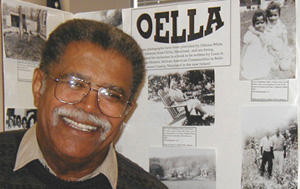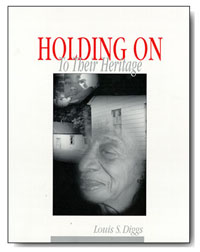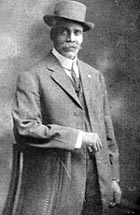| Maryland Newsline |
| Home Page |
Politics
|
| Baltimore County Man Tracks Down
Forgotten History
By
Sonia Kumar CATONSVILLE, Md. – Louis Diggs was teaching students at Catonsville High School how to research their roots when he realized they weren’t coming up with anything, because nothing relevant was written where they could find it. History books, he says, have left out African-Americans and their role in Baltimore. “They don’t say there wasn’t any, or there were any. They just don’t say anything at all about it.” Diggs’first book, “It All Started on Winters Lane,” thus began as a project to help those kids discover the richness of their heritage. “I really wanted something for the kids, the African-American kids,
to prove that we as African-Americans did have a little bit of something
to say about Catonsville,” Diggs says. “After all, we are due our
history.”
The cover of Diggs'
second
book, which includes the histories of Bond Avenue and
Piney Grove. (Courtesy Louis Diggs)
Since that first book was published in 1995, Diggs
has spent much of his time researching and writing books about several of the 40
historically African-American settlements in Baltimore County. He has
written three more books: "Holding On To Their Heritage," "In Our
Voices" and "Since the Beginning." He is working on his fifth. Along with the narratives he
gathers through interviews, Diggs has amassed an enormous
collection of historical photographs that grace the pages of his books. He
also lectures and conducts workshops in genealogy research to all sorts of
audiences throughout the Baltimore area.
Diggs
says the enthusiasm of the children who read his books keeps him going, as
do the tidbits of fascinating history he uncovers from interviews and old
documents: that Thurgood Marshall’s legal career began with Margaret
Williams vs. the Baltimore County Board of Education, in a petition on
behalf of Williams, who was fighting to attend her neighborhood Catonsville
High School instead of a black
school in Baltimore; that a Pizza Hut and Midas Muffler on Route 40 sit on
a paved-over black cemetery; that Rolling Road owes its name to slaves.
The slaves rolled barrels of tobacco over the old Indian trail
down to ships on the Potomac River in Elkridge.
Margaret Wilson's father hired Thurgood Marshall in 1935
to try to register Margaret and another classmate at the all-white high school in Catonsville. (Courtesy Louis Diggs)
The
stories pour out of Diggs, who doesn't have a single page of notes in
front of him.
He
cuts an impressive figure, tall and broad-shouldered, but gentle and
mild-mannered. His voice is warm and gravelly, well-suited to oration.
He’s got a touch of a drawl and the long o’s typical of a Baltimorean
accent. In Diggs' mouth "I'm" sounds like "Ah'm" and "out" sounds like "owte."
His
conversations tend to end with the words "thank you now."
At 69, Diggs has retired twice already, and both times he hasn’t been able
to stay retired. In 1970, he retired from the U.S. Army after serving for
more than 20 years. That didn't last, and he began working as a military
instructor at Ballou High School in Washington, D.C.--retiring from the
D.C. Public School system in 1989.
It was after his second retirement that
Diggs volunteered to teach students at Catonsville High School how to
research their roots. He also realized that he wanted to collect information about his
own family’s history for his children and grandchildren.
“I’m a
father, and a grandfather, and I know one day my kids or grandkids will
want to know something about their family heritage,” he says.
'You
Can't Change History, But You Should Know About It'
Diggs
tries to keep his work from inciting tempers, a difficult task considering
the controversy inherent in the stories he has to tell – of slavery, the
legacy of racial inequality, heroes ignored for the color of their skin,
illegitimate children, segregation.
“I tell kids when I mention these things that there’s no need to get angry
about it. You cannot change history,” Diggs says, “but you should know
about it.” Sometimes Diggs has a hard time getting older
African-Americans to open up to him.
"They don't like to talk about it," he says,
"because it hurts."
Diggs
himself recalls drinking from water fountains marked "Colored
only," and using the back door to enter restaurants when Baltimore
was still segregated. When he talks about his own experiences as a
student, Diggs remains calm, although frustration flares out in the
occasional word or phrase.
“When
I was in school, they said that after slavery, people in the black
community were lazy, shiftless, didn’t contribute anything to anything.
That really bothered me,” Diggs says. During the course of the past
decade, this has been a theme that he has sought to refute, and he has
done so successfully, documenting scores of initiatives that originated in
the black communities of Baltimore.
Diggs
describes how working black men pooled together their money to create the
Catonsville Cooperative Corp. in the late 1800s, which was responsible for
creating an amusement park with a religious theme, Greenwood Electric
Park, that many of Diggs' interviewees still remember today.
Kristi Alexander,
executive director of the Baltimore County Historical Society, says Diggs' work is important to the entire
community. His focus on African-American history in Maryland "provides an area of
researched history untapped until now," she says.
Diggs
does everything from researching to laying out the books he writes. When he
decides to write about a community, he begins by looking for a central
place to begin his research. Usually, he will turn to churches or
community centers and approach elderly members to set up interviews and
make arrangements to reproduce their photos. Diggs says he prefers people
who are around 80 years old, although for each community he interviews one
younger person (40 or 50 years old, preferably a family historian)
for a "younger perspective of the community."
Once
he has begun, Diggs spends his time interviewing, transcribing, scanning
photos and writing.
It
All Started on Dewey Avenue
Diggs' great-grandfather, John Eli Diggs. He was born in Piney Grove,
in Boring, Md.
(Courtesy Louis Diggs)
To
echo the title of Diggs’ first book, it all started on Dewey Avenue in
the Hoes Heights area in Baltimore. Diggs was born there April 13, 1932, to
George and Agrada Diggs. He dropped out of Douglass High School in 1950--having completed only the 10th grade--to join the all-black Maryland National Guard. He earned his GED in
Korea, where he fought from 1950 to 1952.
After
returning from Korea, Diggs met Shirley Washington. The two tried to elope
the night before Diggs was shipped out to Germany, but a snowstorm
kept them from making it to Elkton. Diggs wrote Shirley letters every day
until he returned and the two married. In 1957, Diggs was appointed
sergeant major of the ROTC detachment at Morgan State College, and he and
his wife began raising children. Seven years later, the Diggs family moved
to Germany, where Diggs was stationed for three years.
When
they returned to the United States, the Diggses moved to Catonsville and built a home on Arunah Avenue, two blocks off
Winters Lane, where Diggs and his wife have lived since 1979. Over
the years, Diggs earned an associate's degree from Catonsville Community
College (1976), a bachelor's degree from the University of Baltimore
(1979), and a master's of public administration, also from the University
of Baltimore (1982). He did post-graduate work at George Washington
University.
Diggs,
who has four sons and nine grandchildren, says his family has been
supportive of his efforts to document local African-American history. He's
hoping that eventually his son Terry will maintain the work he's already
done, if he doesn't have an interest in adding to it.
"He's doing a
beautiful thing," Shirley Diggs says of her husband's work. She says
she isn't bothered by the amount of time he devotes to his work; she
thinks it's good for him to keep a schedule and stay active. "He gets
up every morning at 4:30 or 5," she says. "I call it his
second job." She adds his work has brought the family closer
together: Their sons have helped Diggs to create his own Web page and covers
for his books and to resolve computer problems.
"I
truly truly believe in what I'm doing," Diggs says. "I'm deeply
concerned that our youth, the youth of the future, will not know our
history in these small communities." Diggs was so concerned that he
founded the Black Writers Guild of Maryland as a support system for
African-American writers; the group was awarded nonprofit status last
year. Diggs plans on applying for a $100,000 grant from the National
Endowment for Arts to help people in other areas who want to document the
history of their communities.
"It's
so needed," Diggs says, shaking his head. "African-American
children need to know our history."
Copyright © 2001 University of Maryland College of
Journalism. Text and limited photos available, with permission and credit,
for use by Capital News Service clients.
|




